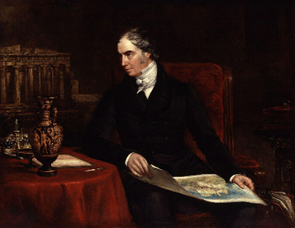Lord Aberdeen
1784-1860
Was a British statesman, diplomat and Scottish landowner, successively a Tory, Conservative and Peelite politician and specialist in foreign affairs. He served as Prime Minister from 1852 until 1855 in a coalition between the Whigs and Peelites, with Radical and Irish support. The Aberdeen ministry was filled with powerful and talented politicians, whom Aberdeen was largely unable to control and direct. Despite his trying to avoid this happening, it took Britain into the Crimean War, and fell when its conduct became unpopular, after which Aberdeen retired from politics. Born into a wealthy family with large estates in Scotland, his personal life was marked by the loss of both parents by the time he was eleven, and of his first wife after only seven years of a happy marriage. His daughters died young, and his relations with his sons were difficult. He travelled extensively in Europe, including Greece, and he had a serious interest in the classical civilisations and their archaeology. His Scottish estates having been neglected by his father, he devoted himself (when he came of age) to modernising them according to the latest standards. Aberdeen was generally successful as a hard-working diplomat, but his reputation has suffered greatly because of the lack of military success in the Crimean War and from the ridicule of enemies such as Disraeli who regarded him as weak, inefficient, and cold. Before the Crimean debacle that ended his career he scored numerous diplomatic triumphs, starting in 1813-14 when as ambassador to the Austrian Empire he negotiated the alliances and financing that led to the defeat of Napoleon. He played a central role in winning the Opium Wars against China, gaining control of Hong Kong in the process. He was a member of the General Assembly of the Church of Scotland from 1818 to 1828 and exercised his existing rights to present ministers to parishes on his Scottish estates through a time when the right of churches to veto the appointment or 'call' of a minister became so contentious as to lead in 1843 to the schism known as "the Disruption" when a third of ministers broke away to form the Free Church of Scotland. In the House of Lords, in 1840 and 1843, he raised two Compromise Bills to allow presbyteries but not congregations the right of veto
